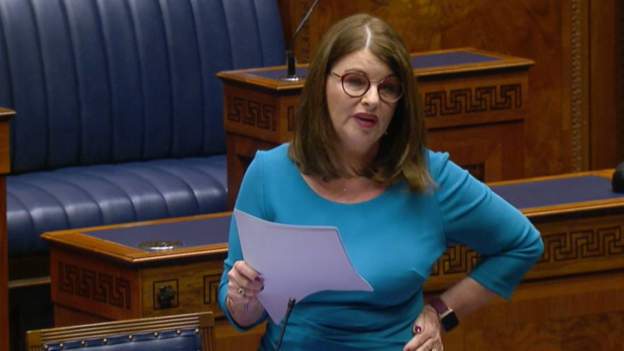
SDLP Jobs spokesperson Sinead McLaughlin
The Make Change Programme, the first of its kind in these islands, is designed to get high-achieving graduates, experienced professionals and ambitious school leavers into the civil service specifically to work on some of the most challenging priorities Northern Ireland faces.
It is well known that Northern Ireland faces a ‘brain drain’ crisis, with many of the most talented and qualified young people frustrated at the slowness of change in society, but not encouraged to take up a career in public service.
Meanwhile, the civil service faces well-publicised challenges in capacity and capability – highlighted by multiple independent reports – but is also addressing a looming crisis in its workforce, with 80 per cent of its senior civil servants over the age of 50 and just one per cent of the entire workforce under the age of 25.
The Make Change Programme aims to address both of these challenges: creating a new excitement and prestige around public service, incentivising talented young people to develop amazing careers tackling deep rooted problems – and helping to address systemic workforce challenges in the civil service itself.
Those selected for the programme will work on cross-cutting projects, matched to the key priorities in the new Programme for Government (PfG).
The SDLP believes the programme should commence in pilot form in summer 2022, in time for new graduates to apply for entry and be assigned to cross-cutting projects under the PfG agreed by the new Executive elected next year.
It is anticipated that the projects will be focused on delivering specific outcomes on agreed priorities, including:
Climate change mitigation
Tackling the waiting list crisis and reforming the health service
Closing the skills gap
SDLP jobs and higher education spokesperson, Foyle MLA Sinead McLaughlin, said: “Too many young people leave this place, in part because they are frustrated at the slowness of change and in part because they look elsewhere for career opportunities.
“But despite the well-publicised issues in civil service capacity, they simply aren’t encouraged to consider a career in public service.
“The SDLP’s Make Change Programme proposal is about addressing these issues, but more than that: it’s about exciting a generation of young people here to get involved in public service careers to improve the lives of others.
“We know that other jurisdictions, including Dublin and London, are successful at attracting ambitious young people, and we also know that programmes like the Peace Corps and Teach First attract and inspire people who want to improve the lives of others.
“As well as inspiring them, this programme should help develop the public service leaders of the future.”
As well being matched to ambitious projects with specific delivery outcomes, often on secondment to delivery agencies, successful Make Change Programme candidates will participate in a leadership training programme covering policy development and other core skills.
Once they complete both their core training and a two-year placement on a PfG priority, they will be eligible for fast tracked promotion in NI departments.
And once the pilot launches successfully, additional Make Change strands would be added for both experienced professionals, whose placements would reflect their own experience and capacity, and school leavers – where apprenticeships would be created to add administrative capacity necessary to deliver on PfG priorities.
Mid-career professionals and apprentices would also participate in additional training programmes, and be eligible for fast-tracked promotion on the basis of their Make Change Programme experience.
Though New Decade, New Approach contained a commitment to further civil service reform, as yet little detail has been provided.
The Finance Minister has committed to restarting the NICS graduate trainee scheme, which was discontinued several years ago, but as yet limited detail has been provided.
SDLP Finance Spokesperson Matthew O’Toole MLA has written to finance Minister Conor Murphy, First and deputy First Ministers, as well as the Head of the Northern Ireland Civil Service to set out the proposal in detail and suggest the civil service begins scoping work soon in order to start recruiting in summer 2022, after a new Executive has agreed a fresh Programme for Government.
Tags:






